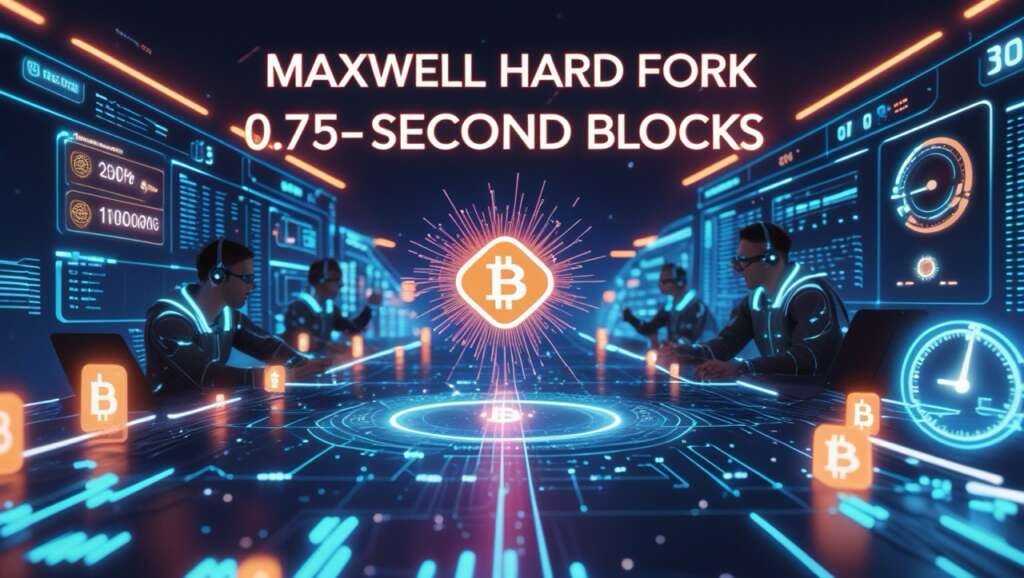BNB Chain is scaling again, and this time, it executed the Maxwell hard fork. This upgrade brings major changes to BSC, cutting block times from 1.5 seconds to 0.75 seconds via BEP-524. The successful upgrade has left many crypto enthusiasts and developers excited.
According to the BSC team, the Maxwell hard fork marks a significant step in their mission to improve network’s responsiveness, speed, and validator performance. But this is more than just improving the network’s performance, it’s about positioning BNB Chain as a leader among competing blockchains. The foundational upgrade shows BNB Chain’s competitive spirit and ambition for boosted scalability and performance.
From Lorentz to Maxwell: What’s Changing with the New Hard Fork Upgrade
The BNB Chain was previously run on the Lorentz hard fork, which reduced block times from 3 seconds to 1.5 seconds. This hard fork laid the foundation for faster DeFi and validator performance. In that span, BNB Chain delivered an average transaction fee of just $0.04 and even ranked first in daily DEX volume.
Apart from faster block times and cheaper network fees, the Lorentz hard fork improved BSC’s network stability. It ensured block finality became more consistent across validators and that validator memory usage and block processing latency were minimal. The new Maxwell upgrade builds on the improvements of Lorentz, improving dApp responsiveness and DeFi interactions.
The Maxwell upgrade is powered by three primary proposals – BEP 524, 563, and 564. While the BEP-524 accelerates transaction confirmations, the BEP-563 will optimize peer-to-peer validator messaging and ensure consensus keeps pace with the faster block times. BEP-564, on the other hand, will ensure smarter block fetching and boost sync speeds between message types, such as the GetBlocksByRangeMsg and RangeBlocksMsg.
Significance of the Maxwell Hard Fork to Users and Developers
For users, transactions will be nearly instant. From transfers to swaps, confirmation times will be almost instantly. In addition, interactions and responsiveness within decentralized applications will be smoother. This enhances user experience and reduces wait times in decentralized applications.
Apart from lower network latency in DeFi and GameFi platforms, the improved hard fork upgrade leads to cheaper fees. Faster blocks means more transactions are processed in a second, which keeps gas fees low.
For developers, lower latency opens the door to new designs of real-time dApps, such as gaming and financial products. In addition, lower latency means lower friction for users, making the onboarding process smoother and simpler. However, developers must update referencing block times to avoid syncing delays.
Broader Gains for BNB Chain
With the Maxwell hard fork upgrade, BNB Chain’s sub-second block times will see it compete with high-throughput chains like Solana. Currently, Solana is seen as the fastest chain in transaction times and scalability, but BNB Chain is catching up really fast.
More transactions per second means lower gas fees, which makes BNB Chain a compelling alternative to Solana for DeFi and enterprise deployments. Furthermore, BNB Chain’s sub-second finality will attract payment service gateways and remittance services, sectors that value speed and usability.
In addition, validators will miss fewer blocks and reorg frequency is minimized, thanks to Maxwell. This improved reliability is essential in fostering network trust.
What Does the Future Hold for the BNB Chain?
According to the BSC team, the Maxwell Hard Fork Upgrade is part of their roadmap. This means more technological upgrades will be seen in the future. Subsequent upgrades could see the inclusion of MEV protection and enhanced EVM compatibility.
In addition, we could witness an ecosystem expansion, where DeFi and GameFi apps will be deployed on the chain. The Maxwell upgrade marks a pivotal point that positions BNB Chain in the hierarchy of fast and scalable chains in the blockchain space.




